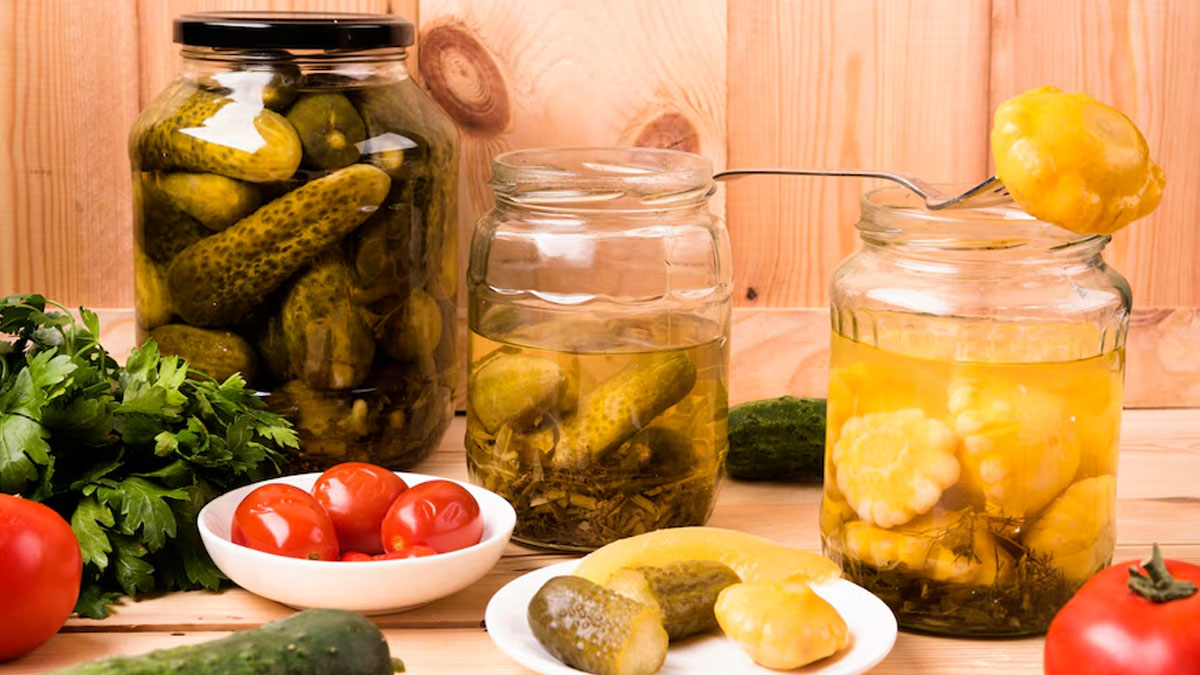
The term snacking tends to bring visions of sweet beverages, packaged chips, or fat-loaded treats. Yet, what if your lunchtime snack could get something more than just easing your hunger? What if it were the key to a strong immune system? This is where fermented foods enter the chat. They undergo a natural process where microorganisms such as yeast and bacteria break down carbohydrates into organic acids or alcohol.
Table of Content:-
This ancient preservation technique has several health benefits, specifically in boosting our immunity. There is a straightforward and important link between our gut health and immunity. Studies sugegst that almost 80% of our immune system lives in your gut.
How Fermented Foods Assist In Boosting Immunity
Fermented foods have good live bacteria that, when you eat in sufficient amount, help keep your body healthy. These are the good things that help maintain your inner ecosystem in balance. Here is how they assist in boostingimmunity:
1. Increasing Gut Microbiome Diversity
A diverse gut is a strong gut. Fermented foods expose the body to a variety of beneficial bacteria strains, which in turn enhances overall gut diversity and health. What they actually do is that they signal, educate, and improve theimmune cells.

Also Read: Is Your Makeup Ageing You? Ingredients That Accelerate Wrinkles
2. Producing Postbiotics
During the fermentation of the bacteria, they create byproducts, or postbiotics, like Short-Chain Fatty Acids (SCFAs). SCFAs are important as they feed the cells that line your gut, which makes the intestinal barrier stronger. A healthy barrier behaves like a gatekeeper, keeping toxins and pathogens out of the bloodstream and not causing unwanted immune response or inflammation.
3. Decreasing Chronic Inflammation
Much research, including that conducted at Stanford, indicates that eating a diet full of fermented foods may reduce molecular indicators of inflammation in the bloodstream. Since chronic, low-grade inflammation is linked with many diseases and impaired immune function, decreasing it is essential to overall health.
Fermented Foods to Eat For Better Immunity
To understand how to best incorporate these foods, we reached out to Shrey Kumar Srivastav, Senior Consultant and General Physician, Sharda Hospital - Noida, and here is what he shared with us.
"The ancient knowledge about fermented foods is now well supported by science. I like to tell my patients that a healthy gut flora is the basis of a strong immune response. Fermented snacks are a great, convenient way to add those good cultures on a regular basis," he explained
Dr Srivastav also recommended incorporating these easy-to-digest and affordable fermented snacks:
1. Yoghurt or Curd (Dahi)
"A household favourite in Indian homes, make sure you opt for plain yoghurt containing live and active cultures. It's a great, handy snack, best had with some fresh fruit and nuts," he recommended. The probiotics, mainly Lactobacillus and Bifidobacterium species, come into play here.

Also Read: 5 Symptoms That You Are Down With Current Delhi Viral Infection, Expert Lists
2. Kefir (Fermented Milk Drink)
"Kefir is usually more active than yoghurt, with a greater variety of bacterial and yeast strains, which is great for diversity. A small glass of plain unflavoured kefir is a great, immunity-boosting mid-morning drink."
3. Kimchi and Sauerkraut (Fermented Vegetables)
Enjoy a small serving of traditionally made, unpasteurised kimchi or sauerkraut as a tasty snack. "They're full of probiotics and fiber, which serves as a prebiotic, which feeds the good bacteria,” he noted.
4. Idli and Dosa
"Idli and Dosa batter is fermented naturally. To have them as a snack as one idli or a tiny plain dosa is a great way to have a healthy, probiotic food that can build your immunity"
Dr Srivastav stressed consistency over quantity. According to him, "You don't have to have a great big bowl of these foods. A few tablespoons of sauerkraut, a cup or so of yoghurt, or a small glass of kefir most days of the week will do to notice a benefit to your gut, and therefore to your immunity. Always read labels to make certain products are unpasteurised to ensure the live cultures remain active."
Switching to fermented snacks is an easy, tasty step to proactive health. It's a little change that brings great reward to your gut and a lifesaving barrier for your immune system.
Also watch this video
FAQ
Q1: Is all fermented food probiotic?
A: No. All fermented foods do include microbial activity, but only those with an adequate number of live and active microorganisms (probiotics) that have a scientifically established health benefit can truly be called probiotic. Sour dough bread or beer, for instance, are fermented but the intense heat of baking or processing destroys the healthful bacteria. Always purchase products that are labeled "live and active cultures" or "unpasteurised."Q2: Will I have the same advantages if I take a probiotic supplement?
A: Supplements can be useful, particularly when your doctor prescribes one for a specific illness. Fermented foods, though, deliver more than probiotics: they also give you fiber (prebiotics), vitamins, and postbiotics, all in a natural food matrix that facilitates absorption. Experts usually suggest taking probiotics first in the form of whole foods, as part of your normal diet.Q3: How soon will I see the difference in my immunity or gut health?
A: While some people may notice initial changes in digestion (like less bloating or more regularity) within a few days to a week, the beneficial effects on the immune system are generally gradual and accrue over time. Studies suggesting a decrease in inflammatory markers typically involve consistent consumption over several weeks or months. Consistency in your daily diet is the key to long-term health benefits.
How we keep this article up to date:
We work with experts and keep a close eye on the latest in health and wellness. Whenever there is a new research or helpful information, we update our articles with accurate and useful advice.
Current Version
Sep 28, 2025 08:50 IST
Modified By : Tanya SrivastavaSep 28, 2025 08:50 IST
Published By : Tanya Srivastava
